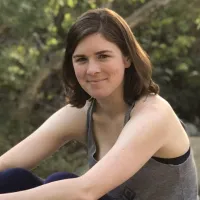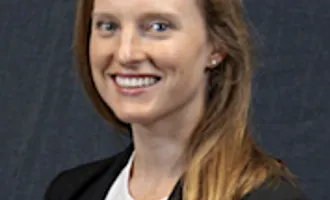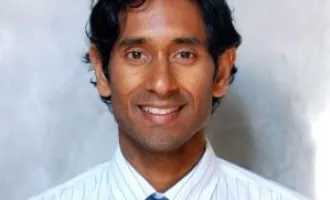Daughterhood
Editor's Note: Kelly Crotty's Daughterhood earned an honorable mention in the Personal Essay category of the Synapse Storytelling Contest.
Something I always admired about my dad is his ability to talk at length on any subject. Even as I pursued my PhD, he would call me up to talk about an article he read on CRISPR or cancer therapy or he would email me links to journal articles he had read. He was never shy about speaking to new people, no matter who they are, and had an incredible talent for making a stranger feel comfortable and familiar.
Making our exit from family events could be a two hour ordeal: he had a novel’s worth of things to say to every person. It is striking, then, that while he spoke so much about such a range of topics, he was tight-lipped when it came to details about himself. He was an inherently private person, even to his own children.
Our family moved from California to Texas in the early 90s so that my parents, born and bred in Los Angeles, could pursue their dream of being ranchers. My first memories are in a two-bedroom/one-bathroom Southeast Texas home that all six of us squeezed into.
Having the entire family share one bathroom was difficult enough, but it was made worse when something went wrong with the old plumbing. My dad, forever a do-it-yourselfer, decided he could figure it and he didn’t need to call a plumber. He shut off the water to the bathroom and removed the entire toilet so he could get a good look at the pipes underneath. He kept his day job as an engineer at a large tech company and unfortunately, he was suddenly called away on a business trip in the middle of the project.
He left in a hurry with the porcelain throne displayed majestically in our driveway. When he returned to his disgruntled family three days later, he was able to fix the plumbing quickly and reassembled the bathroom perfectly.
That home was one of many fix-it-uppers we lived in during the Texas Experiment. I would always tag along with my dad to open houses. We never stayed anywhere for more than a year, and we always got run-down homes on large plots of land. My ambitious parents tried to keep all sorts of animals: cows, goats, ducks, etc., but nothing stuck.
The cows escaped their pasture, gorged on clover from our front lawn, and died from bloating. It was quite a shock to wake up to the bulging pink animals laying in our yard one morning, though my dad chained them to the tractor and dragged them to the back of the property to privately decompose. The goats didn’t even make it to our home: they were determined to stay with their previous owners and no matter how well we tied them in the back of our truck they wriggled free of the constraints and ran back.
After several attempts, we gave up and let them go to their home, where they clearly wanted to be. Their putrid stench stayed in the truck as a reminder of our failure for weeks. And the poor ducklings we bought, the fluffy little creatures my siblings and I were completely enamored by. The ducklings were flattened by a school bus one morning as they crossed the street to the pond only a few weeks after we got them.
Having a ranch in Texas was difficult. My parents, though, had an intrepid spirit that let them encounter each new adventure with optimism and joy. Although we were always outsiders, they made friends everywhere we went. In one of our homes, the mayor of the two-hundred person town we lived in took a liking to them like they were pets.
The mayor was also the electrician, the plumber, and owned the only gas station and restaurant in town, so he was the go-to guy for my parents to call with any question. He was always excited to take their calls, eager to find out what trouble the silly Californians had gotten themselves into this time.
After eight years of the Texas Experiment, though, we had had enough adventures. My mom, who had been homeschooling us, decided we should move somewhere less rural and closer to a good school system because my older brother was going into high school soon. Ideally, she also wanted somewhere without the humidity that made her hair impossible to manage.
We ended up moving to Idaho. We were so used to moving at that point that I barely even processed the news. I do remember, though, my parents asking us not to share with the few friends we did have that we were moving until it was “finalized.”
As I recall, we moved only a couple of days later without being given the green light to say goodbye to anyone.
My dad had to give up his job at the big tech company for us to make the move, and I didn’t know what he did for work after that. I recall several conversations with him where I asked what he did, and it always went the same way.
“Dad, what’s your job? What do you do?”
“Why are you asking? Who wants to know?”
“I want to know! People at school ask me what my dad does and I don’t know what to tell them.”
“Tell them I’m a bum. I don’t do anything. I’m a couch potato.”
“Dad! I’m not telling them that. Don’t you have a job or something?”
“I’m a couch potato.”
He was a “bum” with two offices in our house who would go to work meetings in a suit every few weeks and international business trips almost every year to places like Scotland and Hong Kong. Work meetings!? Business trips!? But he didn’t work! He didn’t have a business! Was this a meeting for the Couch Potato Club?
He would answer these questions with cryptic responses, often confirming that it was indeed a Couch Potato meeting. I think he partly enjoyed my frustrations, but also coveted his privacy.
In college, the plot grew thicker. I called his cell phone one day to ask what time he was arriving that day for a visit, but he didn’t pick up. When he showed up a few hours later, I asked why he didn’t answer his phone.
“What number did you call?” He asked me. I recited the number he had used for over fifteen years.
“That’s not my cell number,” he said. He gave me a new number.
“When did you change numbers?” I asked.
“Oh, I still have the old number too, but that’s not the phone I brought on this trip.”
“... Why do you have two cell phones?”
He gave me a look that said ‘oh, please.’ “I have more than two cell phones.”
“What? Why? How many do you have? Why do you even need more than one?”
He shrugged. “Don’t worry about it.” And he wouldn’t discuss it further.
My friends all had their own theories about what my dad did and why he was so quiet about it: He was a part of the Italian mafia; He was semi-retired CIA; We were in witness protection (which also explained why we moved so much when I was younger).
We mostly favored the CIA idea, imagining him as a dashing, secretive agent like Arnold Schwartzenegger’s character in True Lies.
After fourteen years of confusion and intrigue surrounding my dad’s profession, he surprised us all and took a job as a high school physics teacher. I think he enjoyed having a classroom of kids that were forced to be his audience, and we had fewer questions about how he spent his time. It truly seemed like he had found his vocation.
His time teaching was cut short when he was diagnosed with terminal cancer. After finishing out the school year, he resigned from teaching. He wouldn’t do a job that he couldn’t put all his energy into, and he didn’t enough energy to give.
He visited the school often during his treatments to the joy of his former students, who would send the word out and gather in a classroom to have lunch with him and listen to him talk.
After he passed away, some small mysteries were solved: we met his business partners from several local start-ups that he was involved in as the CFO.
His international travels were often to meetings for the Financial Analyst Society as a representative of the Idaho Branch. My grandma told me in passing that in the late 80s my dad had an interview with a government agency. He told her that he turned down the job because they said he wouldn’t be allowed to tell anyone what he worked on, not even his family, which made us all think.
I won’t ever know everything about my dad, but I think he would probably prefer it that way.



